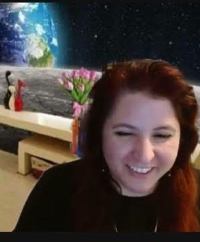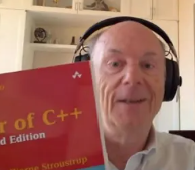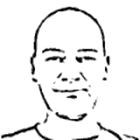Reddit: C++ Tokyo Meetup with JF Bastien, Jason Turner, Chris DiBella
Far east (const?) panel, starting right off with modules:
C++ Tokyo Meetup with JF Bastien, Jason Turner, Chris DiBella
March 11-13, Online
March 16-18, Madrid, Spain
March 23-28, Croydon, London, UK
March 30, Kortrijk, Belgium
May 4-8, Aspen, CO, USA
May 4-8, Toronto, Canada
June 8 to 13, Brno, Czechia
June 17-20, Folkestone, UK
September 12-18, Aurora, CO, USA
November 6-8, Berlin, Germany
November 16-21, Búzios, Rio De Janeiro, Brazil
By Blog Staff | Dec 24, 2022 10:18 AM | Tags: None
Far east (const?) panel, starting right off with modules:
C++ Tokyo Meetup with JF Bastien, Jason Turner, Chris DiBella
By Blog Staff | Dec 20, 2022 01:54 PM | Tags: None
A canonical example:
by Rainer Grimm
From the article:
Purpose: Defines a family of algorithms and encapsulates them in objects
Also known as: Policy
Use case:
By Blog Staff | Dec 19, 2022 02:10 PM | Tags: None
 Hot off the video press:
Hot off the video press:
By Blog Staff | Dec 19, 2022 01:53 PM | Tags: None
With or without actual templates:
by Rainer Grimm
From the article:
The key idea of the Template Method is easy to get. You define the skeleton of an algorithm that consists of a few typical steps. Implementation classes can only override the steps but cannot change the skeleton. The steps are often called hook methods...
By Blog Staff | Dec 17, 2022 03:05 PM | Tags: None
 ABSA == Ask Bjarne Stroustrup Anything:
ABSA == Ask Bjarne Stroustrup Anything:
By Blog Staff | Dec 17, 2022 03:00 PM | Tags: None
 More safety please:
More safety please:
by Gabor Horvath
From the article:
The C++ Core Guidelines’ Lifetime Profile, aims to detect lifetime problems, like dangling pointers and references, in C++ code. ... Lately, there has been an increased push in the C++ community to introduce lifetime-related safety features, which has led us to revisit the lifetime analysis in MSVC.
We spent the last couple of months looking into the results of using the lifetime analysis on real world code. This blog post summarizes our experience and the improvements we made along the way. The biggest change is the introduction of a new set of warnings. These warnings are the high-confidence versions of the existing warnings. Users who want less noise can enable only the high-confidence warnings, while users who want more rigorous checks at the cost of noise can enable both the old and the new warnings. As of 17.5, the high-confidence warnings are still experimental, but depending on the feedback we might include them in some of the recommended profiles in future versions...
By Blog Staff | Dec 17, 2022 02:59 PM | Tags: None
When profiling is a good thing:
C/C++ Profiling Tools
by David Faure
From the article:
This blog will give you a brief overview of profiling C and C++ applications. Additionally, it will lay before you all of the tools available, with the purpose of aiding you in choosing the right tools at the right times...
By Blog Staff | Dec 17, 2022 02:45 PM | Tags: None
 Const... times four:
Const... times four:
by Bartlomiej Filipek
From the article:
As of C++20, we have four keywords beginning with const. What do they all mean? Are they mostly the same? Let’s compare them in this article...
By Blog Staff | Dec 16, 2022 01:29 PM | Tags: None
Just in time for the holidays, a major new Taylor Swift album Boost library release just dropped:
Boost verison 1.81.0 released
Release managers: Marshall Clow and Glen Fernandes
From the announcement:
New Libraries
Updated Libraries
consigncompletion token adapter, which can be used to attach additional values to a completion handler.any_completion_handler<>, which can be used to type-erase completion handlers.experimental::co_composedto enable lightweight implementations of user-defined asynchronous operations using C++20 coroutines.experimental::make_parallel_group()overloads.any_completion_executor, a type-erased wrapper for executors that are associated with completion handlers.contextquery to use_future's executor.execution::any_executor<>andany_io_executor.execution::any_executorobjects to improve the performance of copy and move operations.associated_cancellation_slotspecialisation forstd::reference_wrapper.getfunctions.spawnimplementation to catch unhandled exceptions and rethrow them outside of the spawned "thread".spawnto ensure the completion handler is dispatched through the correct executor.spawn"thread" objects.spawnandco_spawnimplementations to dispatch cancellation handlers on the correct executor.execution::executecustomisation point and sender/receiver facilities.parallel_groupexample.resolveconversions.experimental::channel_traitsspecialisations.R(error_code)signature.cancelled()public on theasync_compose'self' object.async_compose'self' object.release()for Windows overlapped handles.experimental::coro, regularisedexperimental::use_coro, and fixed allocator handling.experimental::promiseand made it an asynchronous operation object.post/deferoverloads on ability to requireblocking.never.fcntlifioctlfails withENOTTYwhen setting non-blocking mode.sprintf.select_reactor::runwhen it is run on an internal thread.BOOST_ASIO_DISABLE_SMALL_BLOCK_RECYCLINGis defined.std::invoke_resultwhen targeting C++17 or later.
buffers_generatorbeast::http::message_generatorbuffer_ref, so beast buffers can be used with asio.
boost::hashhave been removed; it now always callshash_value.BOOST_HASH_NO_EXTENSIONShas been removed. The extensions are always enabled.std::forward_listand the unordered associative containers.begin()andend()member functions that return iterators) are now supported out of the box.BOOST_DESCRIBE_STRUCTorBOOST_DESCRIBE_CLASS) are now supported out of the box.hash_combinehas been improved.boost::hashfor strings now passes SMHasher in 64 bit mode.
empty_valuemembers are now marked asconstexpr.fclose_deleter, a deleter that callsstd::fcloseon a pointer tostd::FILE.boost/core/bit.hppnow explicitly require unsigned integers on input. (#129)bit_widthnow returnsintinstead of a value of the input argument type. This follows resolution of LWG3656.
enumerators.hpp,bases.hpp, andmembers.hppwhen the option-pedanticis used, the invocation ofBOOST_DESCRIBE_ENUMhas been moved frommodifiers.hppinto a separate header,modifier_description.hpp. As a consequence,modifiers.hppno longer includesenum.hpp. Code that has been relying on this implicit inclusion may fail, and will need to be fixed to includeenum.hpp.
pathconstruction, assignment and appending from containers of characters, such asstd::vector<char>orstd::list<wchar_t>, is deprecated in v3 and removed in v4. Please use string types or iterators instead.boost/filesystem/path_traits.hppheader is deprecated and will be removed in a future release. The header contained implementation details ofpathand should not be used in user's code.BOOST_FILESYSTEM_ALLOW_DEPRECATEDmacro can be defined when compiling user's code.*atAPIs. (#250)weakly_canonicalfailing with anERROR_INVALID_FUNCTIONerror code if the path started with the "\\?\" prefix. (#247)std::string_view,boost::string_viewandboost::container::string(as well as respectivewchar_tcounterparts) inpathconstructors, assignment and appending operations. (#208)pathconstructors, assignment and appending operations taking a pair of iterators will no longer accept iterators with value types that are not one of the supported path character types.
fusion::identity_view(PR#240)fusion::transform_view(PR#239)fusion::reverse_viewused with an associative sequence (PR#237)boost::refandboost::noncopyableare used from Boost.Core (PR#249)
accumulators::fractionto compute fractions, their variance, and confidence intervalsutility::clopper_pearson,utility::wilson_interval,utility::jeffreys_interval,utility::wald_intervalwhich can compute intervals with arbitrary confidence levelutility::confidence_levelandutility::deviationtypes to pass confidence levels as probabilities or in multiples of standard deviation for all interval computers, respectivelysub_arrayandspanin C++20
function_output_iteratornow supports perfect forwarding of the assigned values to the wrapped function object. (PR#73)function_input_iteratorfrom result of post-incrementing anotherfunction_input_iterator. (#75)iterator_facadenow supportsoperator->.(it++)->foois equivalent to(*it++).foo, which was supported before.
object::stable_erase.parseoverload forstd::istreamandoperator>>forvalue.value.std::optional,std::variant, and null-like types (includingstd::nullptr_t,std::nullopt_t, andstd::monotype).valueto user types.
-sICU_LINK_LOCALE&-sICU_LINKby fine-grained configuration options as done in Boost.RegExstd::auto_ptrcodecvtusingwchar_ton Windows assume/use UTF-16 encondingbasic_format,date_time&hold_ptrmovable, Fix use of format cache*thisdate_time
BOOST_STACKTRACE_BACKTRACE_INCLUDE_FILEmacro value while detecting the libbacktrace availability in b2, thanks to Ben Gemmill for the bug report #115.BOOST_STACKTRACE_BACKTRACE_FORCE_STATICmacro to force a single backtrace_state static instance while using the libbacktrace. Thanks to the Rasmus Thomsen for the bug report #118!boost/stacktrace/stacktrace.hppheader. Thanks to the Long Deng for the bug report #116.strlenon Windows platforms. Thanks to Alex Guteniev for the bug report #122
iterator_interfaceoperators in pre-C++20 iterators with aconstvalue_type.
BOOST_SYSTEM_DISABLE_THREADScan now be defined to disable the use of<mutex>(e.g. on single-threaded libstdc++).value_type,error_type,in_place_value,in_place_errortoresult<>.emplacetoresult<>.
boost::unordered_flat_mapandboost::unordered_flat_setbased on open addressing.
boost::json::value_fromandboost::json::value_to.
By Andrey Karpov | Dec 16, 2022 01:00 AM | Tags: visual studio code qt creator pvs-studio
PVS-Studio 7.22 has been released. It includes plugins for Visual Studio Code and Qt Creator, support of .NET 7 projects analysis, enhanced Best Warnings filter and new diagnostic rules.
PVS-Studio 7.22: Visual Studio Code, Qt Creator, .NET 7
by Sergey Vasiliev
From the article:
New plugins provide even more options for cross-platform work. Now you can use them to work with logs: view warnings, filter them, sort them in a grid, etc. You can't run the analysis yet — we plan to add this feature in future releases.